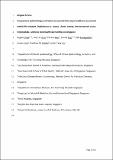Comparative epidemiology and factors associated with major healthcare-associated methicillin-resistant Staphylococcus aureus clones among interconnected acute-, intermediate- and long-term healthcare facilities in Singapore
Abstract
Objectives Methicillin-resistant Staphylococcus aureus(MRSA) has spread across countries and healthcare settings, with different ecological niches for different clones. It is crucial to understand the comparative epidemiology of MRSA clones between healthcare settings, and independent factors associated with colonization of specific clones. Methods We conducted annual cross-sectional surveillance studies in a network comprising an acute-care hospital and six closely-affiliated intermediate- and long-term care facilities in Singapore, in June-July, 2014-2016. 5,394 patients contributed 16,045 nasal, axillary and groin samples for culture and MRSA isolates for whole genome sequencing. Multivariable multilevel multinomial regression models were constructed to assess for independent factors associated with MRSA colonization. Results MRSA clonal complex(CC) 22 was more prevalent in the acute-care hospital(n=256/493; 51.9%) and intermediate-care(n=348/634; 54.9%) than long-term care(n=88/351; 25.1%) facilities, with clones besides CC22 and CC45 being more prevalent in long-term care facilities(n=144/351; 41.0%) (P<0.001). Groin colonization with CC45 was 6 times that of nasal colonization(aOR 6.21, 95%CI 4.26-9.01). Prior MRSA carriage was associated with increased odds of current MRSA colonization in all settings, with a stronger association with CC22(aOR 6.45, 95%CI 3.85-10.87) than CC45(aOR 4.15, 95%CI 2.26-7.58). Conclusions Colonization of MRSA clones differed between anatomic sites and across healthcare settings. With CC22 having a predilection for the nares and CC45 the groin, MRSA screening should include both sites. Prior MRSA carriage is a risk factor for colonization with predominant MRSA clones in the acute-care hospital and intermediate- and long-term care facilities. Contact precautions for prior MRSA-carriers on admission to any healthcare facility could prevent intra- and inter-institutional MRSA transmission.
Citation
Chow , A , Htun , H L , Hon , P-Y , Ang , B , Kanagasabai , K , Koh , J , Holden , M T G & Hsu , L-Y 2020 , ' Comparative epidemiology and factors associated with major healthcare-associated methicillin-resistant Staphylococcus aureus clones among interconnected acute-, intermediate- and long-term healthcare facilities in Singapore ' , Clinical Microbiology and Infection , vol. In press . https://doi.org/10.1016/j.cmi.2020.07.034
Publication
Clinical Microbiology and Infection
Status
Peer reviewed
ISSN
1198-743XType
Journal article
Description
Funding: Bioinformatics and Computational Biology analyses were supported by the University of St Andrews Bioinformatics Unit that is funded by a Wellcome Trust ISSF award (grant 097831/Z/11/Z). M.T.G.H is supported by the Scottish Infection Research Network and Chief Scientist Office through the Scottish Healthcare Associated Infection Prevention Institute consortium funding (CSO Reference: SIRN10).Collections
Items in the St Andrews Research Repository are protected by copyright, with all rights reserved, unless otherwise indicated.

